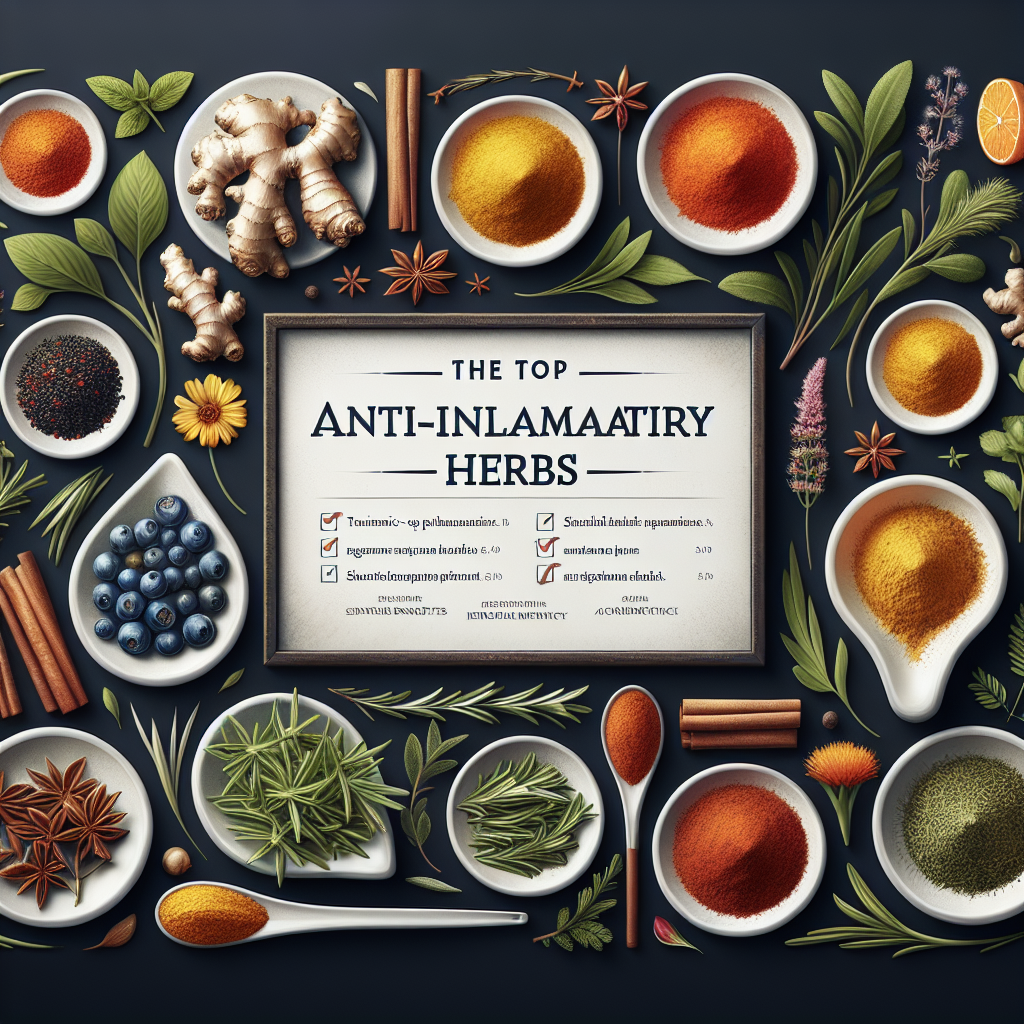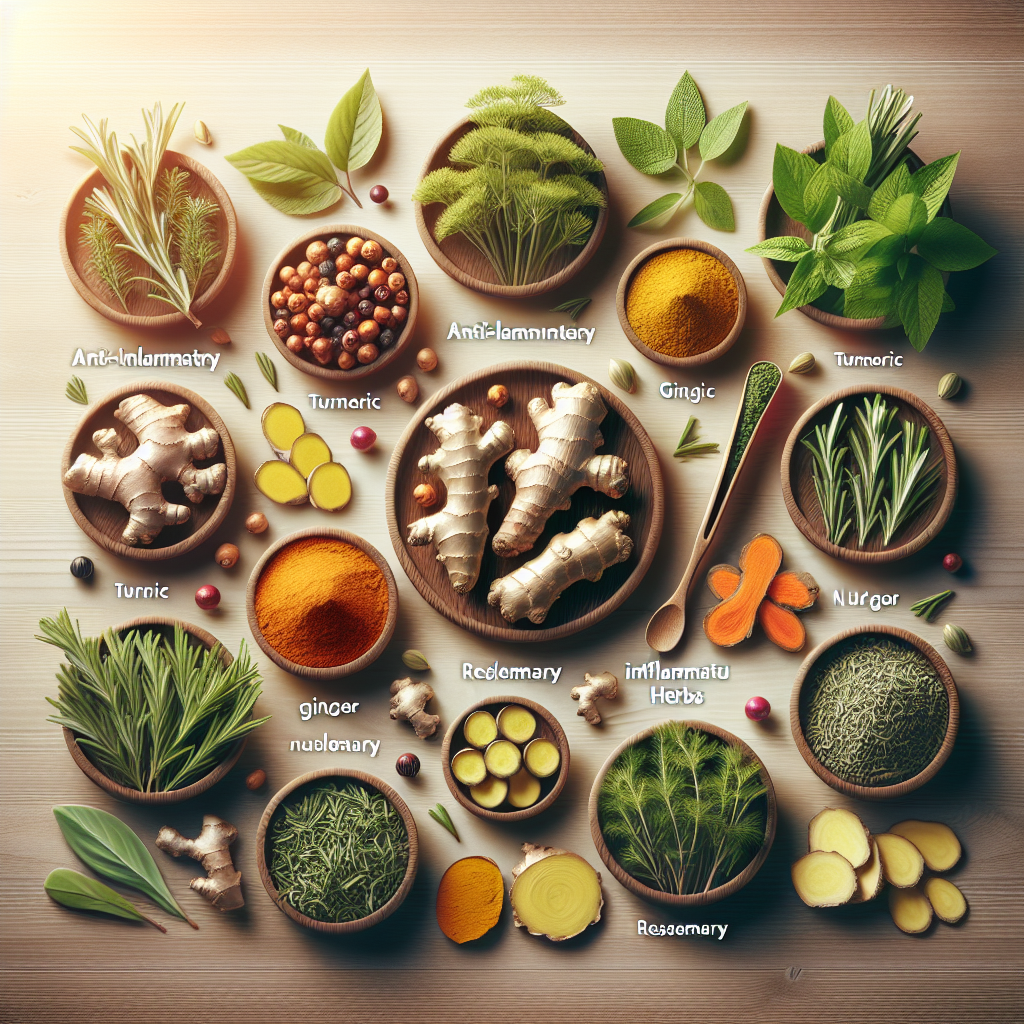Top Anti-Inflammatory Herbs That Actually Work

Discover the top anti-inflammatory herbs that actually work! Improve your health and vitality today. Click here to learn more.
Exploring the Top 3 Anti-Inflammatory Herbs That Deliver Real Results
In the realm of natural remedies, herbs have been used for centuries to treat a myriad of health conditions. Among these, inflammation is a common ailment that can lead to chronic diseases such as heart disease, cancer, and arthritis if left unchecked. Fortunately, nature has provided us with a plethora of herbs that possess potent anti-inflammatory properties. This article will explore the top three anti-inflammatory herbs that have been scientifically proven to deliver real results.
First on our list is turmeric, a golden spice that has been a staple in Indian cuisine and Ayurvedic medicine for thousands of years. The primary active ingredient in turmeric is curcumin, a compound that has been extensively studied for its powerful anti-inflammatory effects. Curcumin works by inhibiting the activity of several enzymes in the body that trigger inflammation. Numerous studies have shown that curcumin is as effective as some anti-inflammatory drugs, without the side effects. Moreover, curcumin has been found to be beneficial in managing conditions such as rheumatoid arthritis and inflammatory bowel disease. However, curcumin is not easily absorbed by the body, so it is often recommended to consume it with black pepper, which contains piperine, a substance that enhances the absorption of curcumin by 2000%.
Next, we turn our attention to ginger, a root that is not only a flavorful addition to many dishes but also a potent anti-inflammatory herb. Ginger contains compounds called gingerols and shogaols, which have been found to have anti-inflammatory and antioxidant effects. These compounds work by blocking the production of substances that promote inflammation in the body. Research has shown that ginger can help reduce inflammation and pain in individuals with osteoarthritis. Additionally, a study published in the Journal of Pain found that consuming ginger daily can even reduce exercise-induced muscle pain by 25%.
Lastly, we delve into the benefits of green tea, a beverage revered for its health-promoting properties. Green tea is rich in polyphenols, particularly a catechin called epigallocatechin-3-gallate (EGCG). EGCG has been shown to have potent anti-inflammatory effects. It works by reducing the production of pro-inflammatory cytokines and enzymes that play a key role in inflammation. Regular consumption of green tea has been linked to a lower risk of diseases associated with chronic inflammation, including heart disease, diabetes, and certain types of cancer.
In conclusion, turmeric, ginger, and green tea are three herbs that have been scientifically proven to have potent anti-inflammatory properties. Incorporating these herbs into your diet can be a natural and effective way to combat inflammation and promote overall health. However, it’s important to remember that while these herbs can help manage inflammation, they should not replace conventional medical treatment. Always consult with a healthcare professional before starting any new treatment regimen. With their guidance, these herbs can be a valuable addition to your health and wellness routine.
Unveiling the Most Effective Anti-Inflammatory Herbs for Natural Healing

In the realm of natural healing, the use of herbs has been a time-honored approach to managing health and wellness. Among the myriad of health benefits that herbs offer, their anti-inflammatory properties are particularly noteworthy. Inflammation, while a natural response to injury or illness, can become chronic and lead to various health issues when not properly managed. Fortunately, nature has provided us with a plethora of herbs that can help combat inflammation effectively.
Turmeric, a golden spice native to Southeast Asia, is arguably the most well-known anti-inflammatory herb. Curcumin, the active compound in turmeric, has been extensively studied for its potent anti-inflammatory effects. It works by inhibiting the activity of several enzymes involved in the inflammatory process, thereby reducing inflammation and pain. Incorporating turmeric into your diet can be as simple as adding it to your favorite dishes or taking it as a supplement.
Ginger, another spice that hails from Asia, is also renowned for its anti-inflammatory properties. Like turmeric, ginger contains compounds that inhibit the production of inflammatory substances in the body. It has been used for centuries in traditional medicine to treat a variety of ailments, from digestive issues to arthritis. Consuming ginger in the form of tea, or adding it to your meals, can help alleviate inflammation.
Green tea, a staple in many Asian cultures, is packed with antioxidants known as catechins. One of these catechins, epigallocatechin-3-gallate (EGCG), has been shown to have powerful anti-inflammatory effects. EGCG works by blocking the production of pro-inflammatory cytokines, which are proteins that promote inflammation. Regular consumption of green tea can therefore help reduce chronic inflammation and protect against related diseases.
Rosemary, a fragrant herb commonly used in cooking, is another potent anti-inflammatory herb. It contains several compounds, such as rosmarinic acid and carnosol, which have been shown to have anti-inflammatory and antioxidant effects. Adding rosemary to your diet can not only enhance the flavor of your meals but also help combat inflammation.
Lastly, the humble garlic, a staple in many kitchens, is not to be overlooked for its anti-inflammatory properties. Garlic contains a compound called allicin, which has been found to have anti-inflammatory effects. Allicin works by inhibiting the activity of inflammatory enzymes, much like curcumin in turmeric. Regular consumption of garlic can therefore help manage inflammation.
In conclusion, the use of herbs as natural anti-inflammatory agents is a viable and effective approach to managing inflammation. Whether it’s the golden turmeric, the spicy ginger, the refreshing green tea, the fragrant rosemary, or the pungent garlic, these herbs not only add flavor to our meals but also offer significant health benefits. However, it’s important to remember that while these herbs can help manage inflammation, they should not replace conventional medical treatment. Always consult with a healthcare professional before starting any new health regimen. With the right balance, these anti-inflammatory herbs can be a valuable addition to a holistic approach to health and wellness.
The Power of Nature: Top Anti-Inflammatory Herbs That Truly Work
The power of nature is truly remarkable, especially when it comes to the healing properties of herbs. Among the many benefits that herbs offer, their anti-inflammatory properties stand out as particularly noteworthy. Inflammation is a natural response of the body to injury or illness, but when it becomes chronic, it can lead to serious health issues such as heart disease, diabetes, and cancer. Fortunately, nature has provided us with a plethora of herbs that can help combat inflammation effectively.
Turmeric, a vibrant yellow spice commonly used in Indian cuisine, is one of the most potent anti-inflammatory herbs known to man. The active ingredient in turmeric, curcumin, has been scientifically proven to reduce inflammation at the molecular level. It works by blocking NF-kB, a molecule that travels into the nuclei of cells and turns on genes related to inflammation. This makes turmeric a powerful ally in the fight against chronic inflammatory diseases.
Another herb that has been revered for its anti-inflammatory properties is ginger. This root, which is a staple in many Asian cuisines, contains compounds called gingerols that have potent anti-inflammatory and antioxidant effects. Studies have shown that ginger can help reduce inflammation and pain in people with osteoarthritis and rheumatoid arthritis. Moreover, it has been found to be effective in reducing inflammation in the intestines, making it a beneficial herb for those with inflammatory bowel disease.
Green tea, while not technically an herb, is worth mentioning for its potent anti-inflammatory properties. The polyphenols found in green tea, particularly epigallocatechin-3-gallate (EGCG), have been shown to have powerful anti-inflammatory effects. EGCG works by inhibiting the production of pro-inflammatory cytokines, thereby reducing inflammation in the body. Regular consumption of green tea can thus help protect against a variety of inflammation-related diseases.
Rosemary, a fragrant herb often used in Mediterranean cuisine, also boasts impressive anti-inflammatory benefits. It contains two powerful anti-inflammatory compounds, carnosic acid and carnosol, which have been shown to inhibit the production of pro-inflammatory cytokines. This makes rosemary a valuable herb for reducing inflammation and potentially protecting against cancer and heart disease.
Lastly, we have the humble garlic, a common ingredient in many dishes worldwide. Garlic contains a compound called allicin, which has potent anti-inflammatory properties. Allicin works by inhibiting the activity of inflammatory enzymes in the body, thereby reducing inflammation. Regular consumption of garlic can thus help protect against a variety of inflammation-related health issues.
In conclusion, nature has provided us with a wealth of herbs that can help combat inflammation effectively. Incorporating these herbs into our diet can not only add flavor to our meals but also provide us with significant health benefits. However, it’s important to remember that while these herbs can help reduce inflammation, they should not replace conventional medical treatment. Always consult with a healthcare professional before starting any new health regimen. The power of nature is indeed remarkable, but it works best when used in conjunction with modern medicine.